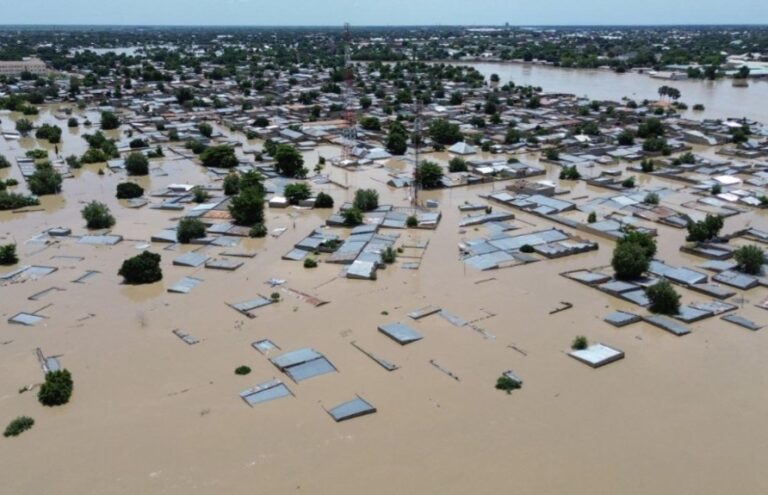By Abdulkareem Alao
The year 2024 was marked by unprecedented crises in various countries across Africa. These crises did not only threaten the lives and livelihoods of millions of people; they threatened the stability and prosperity of the African nations.
Some of the major disasters that rocked the continent include armed violence, climate change, disease outbreaks, and migration tragedies, among others.
With rising temperatures, droughts, and floods, different countries, including Nigeria, experienced multiple deaths and massive displacements. In September 2024, for instance, a collapsed dam in Maiduguri, northeastern Borno State, affected about a million people. While no fewer than 37 lives were lost, at least 400,000 others were displaced, according to the state government.
It also devastated local businesses, as many shops, markets, and trading centres were flooded, resulting in significant losses for traders and entrepreneurs.
One of the victims, Adamu Aminah, who once had a thriving restaurant near Sanda Kyarimi Park, said she’s still struggling to recover from her losses four months after.
“I built my business with a lot of sweat, but today, all my investments are gone with the devastating flood that swept away my expensive cooking utensils. Losing investments worth over N10 million is not a joke. I stopped hawking about 10 years ago, but I have now returned to hawking on the streets,” Aminah lamented.
Like Aminah, many other business owners have returned to ground zero and are struggling to access finance. Although the government at federal and state levels, non-governmental organisations (NGOs), and other stakeholders provided support to affected businesses, many business owners are yet to get back on their feet.
Still in Nigeria, aside from the Borno floods, thousands of people were displaced from their homes in Ibaji, Lokoja, Kogi, and Bassa areas of Kogi State, according to the Nigerian Red Cross Society (NRCS). Most of the affected people reportedly relocated to higher ground in neighbouring areas, including Idah and Lokoja LGAs, while others moved to other states such as Benue, Enugu, Delta, Anambra, and Nasarawa for safety.
Similarly, floods threatened food supply in Nigeria as over 31 million Nigerians are said to be at risk of acute food insecurity. It affected various farmlands across the country, with the top five most impacted states listed as Taraba, Kebbi, Niger, Sokoto, and Jigawa.
Meanwhile, 6.9 million people — almost two in five Somalis—are still in need of humanitarian assistance in Somalia due to the worst drought that left many helpless in the country. In fact, the country was ranked the hungriest country in the world in the 2024 Global Hunger Index.
Other African countries that experienced droughts, floods, and heat waves that devastated agricultural production are Chad, Ethiopia, Kenya, and Democratic Republic of Congo, among others.
Armed violence
Amid these challenges, many African countries have grappled with incessant armed conflicts that have claimed the lives of thousands, displaced millions, wrecked economies, and created serious humanitarian crises.
Today, Africa is home to over 35 non-international armed conflicts, affecting countries like Burkina Faso, Cameroon, the Central African Republic, the Democratic Republic of Congo, Ethiopia, Mali, Mozambique, Nigeria, Senegal, Somalia, South Sudan, and Sudan.
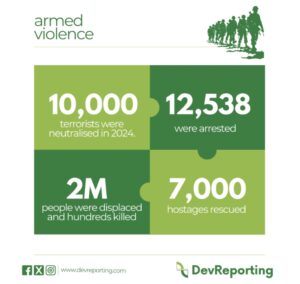
According to the Nigerian military, over 10,000 terrorists were neutralised in 2024. While 12,538 were arrested, the forces rescued over 7,000 hostages. Also, militant groups, such as the Jama’at Nusrat al-Islam wal-Muslimin (JNIM), escalated their attacks on civilians, military personnel, and humanitarian workers in the Sahel.
Similarly, over two million people were displaced and hundreds killed in the incessant clashes between the M23 Rebels and Congolese troops in the DRC.
Disease outbreaks
The continent also witnessed a surge in outbreaks of infectious diseases, including malaria, cholera, and Mpox.
As of December 9, over 700 deaths had been reported in the DRC alone, the epicentre of the Mpox virus. The disease has, however, been declared a public health emergency of global concern by the World Health Organization (WHO) due to the discovery of a more severe strain in 18 Africa countries where over 1,000 deaths have been recorded.
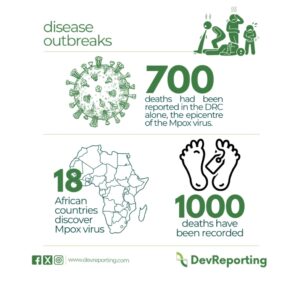
During the final week of the year, 11,200 mpox vaccine doses, donated by the United States of America (USA) and facilitated by Gavi, the Vaccine Alliance, were shipped to Abuja, Nigeria, following the agreements signed in November by Gavi to facilitate the donation of 305,000 doses of mpox vaccine to support the global and continental response.
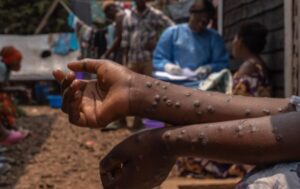
In addition, the cholera outbreak in Nigeria had a significant impact on the country. According to reports, the outbreak occurred in several parts of the country with Lagos State as the epicentre of the disease. As of October 2024, the Nigeria Centre for Disease Control (NCDC) said the cholera outbreak in Nigeria has seen a sharp increase in 2024, with suspected cases rising by an alarming 220 per cent.
As of October 2024, the country had recorded 14,237 reported cases and 378 deaths across 35 states and the Federal Capital Territory (FCT). The highly infectious disease triggered a significant public health concern, especially in communities with inadequate water treatment, poor sanitation, and hygiene practices.
In Lagos, urban slums and densely populated areas with poor sanitation were particularly vulnerable to cholera outbreaks. Experts attributed the spread of the disease to ingestion of food or water contaminated with vibrio cholerae, poor sanitation practices, such as inadequate disposal of faeces and lack of handwashing.
The outbreak affected various age groups, but children under 10years were disproportionately affected, highlighting the importance of continued disease surveillance and preparedness in the continent.
Migrant accidents
There was also a series of migration accidents as many residents tried to escape from conflicts and economic hardship in their respective nations.
According to recent data by a Spanish migration rights group, Caminando Fronteras (Walking Borders), 10,457 deaths were recorded up until December 15, as many Africans tried to reach Spain by sea in 2024.
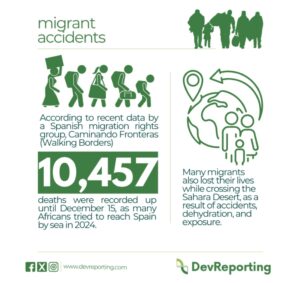
Many migrants also lost their lives while crossing the Sahara Desert, as a result of accidents, dehydration, and exposure. Others were exposed to human rights abuses, overcrowding and poor conditions in migrant camps and detention centre. Analysts say the menace highlights the need for safer migration pathways and humane border management policies.
More disasters
Meanwhile, the 2024 Annual Data Analysis, released by the Lagos State Emergency Management Agency (LASEMA) shows that a total of 1,675 disasters involving fire, building collapse, road, boat mishaps, among others were recorded in the State between January 1 and December 31, with Alimosho Local Government Area topping the list of occurrence.
The data revealed that the road accidents category comprised 438 vehicle accidents, 18 broken down vehicles while the fire disaster category comprised 266 outbreaks, seven tanker/truck fires, and 12 vehicular fires.
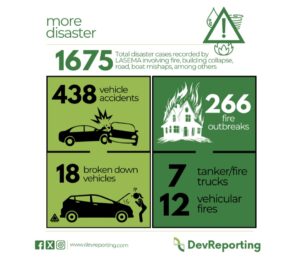
In Ibadan, Oyo state, many are yet to recover from the significant explosion that occurred at Deji Oyelese close in old Bodija, on January 16, 2024. The incident left a trail of devastation, affecting more than 80 houses in the vicinity. While 77 individuals sustained various degrees of injuries, five people lost their lives in the incident. One year after the incident, the affected population continues to experience a range of challenges, including trauma and displacement due to damage to their homes.
Similarly, the state was thrown into disaster on December 18 after 32 children died during a stampede at an end-of-the-year fiesta organised by a non-governmental organisation called Women in Need of Guidance and Support.
According to the radio broadcast for the event, organisers announced the provision of food and gift items for 5,000 children, but nearly 8,000 turned up, causing a stampede. The victims were stampeded to death while trying to break through the main gate of the premises of the event.
On December 21, stampedes during food distribution exercises at two venues killed at least 30 people. While 20 were killed in Okija, Ihiala Local Government Area of Anambra state; 10 others died at the Holy Trinity Catholic Church, Maitama area of capital Abuja.
Also, no fewer than 54 people’s bodies were recovered from Nigeria’s River Niger after a boat carrying over 200 traders from Kogi State capsized in November. A similar disaster led to the death of 70 in Mokwa Local Government Area, Niger State in October.
Call for action
Speaking on the crises affecting the continent, Kazeem Olalekan, a security and climate researcher, urged authorities in the continent to be faithful with their investment on the challenges of climate and other security issues.
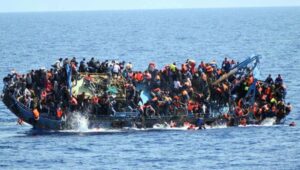
“It appears that African leaders have breached the social contract between them and their citizens. On insecurity, the proliferation of light and small arms poses a significant threat to daily life, and governments need to do more to address this issue. Furthermore, the lack of investment in the health sector and the absence of health insurance for citizens have exacerbated health challenges,” he argued.
“To move forward, governments must prioritise the security and welfare of their citizens. This includes taking concrete steps to curb the spread of small arms and light weapons, investing in the health sector, and providing affordable healthcare options for all.”
Analysts have also charged the international community to support conflicts and emergencies, climate-resilient agriculture, and humane border management policies while various governments are encouraged to address the root causes of these crises, including poverty, inequality, and environmental degradation.

